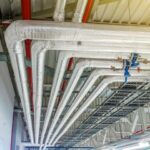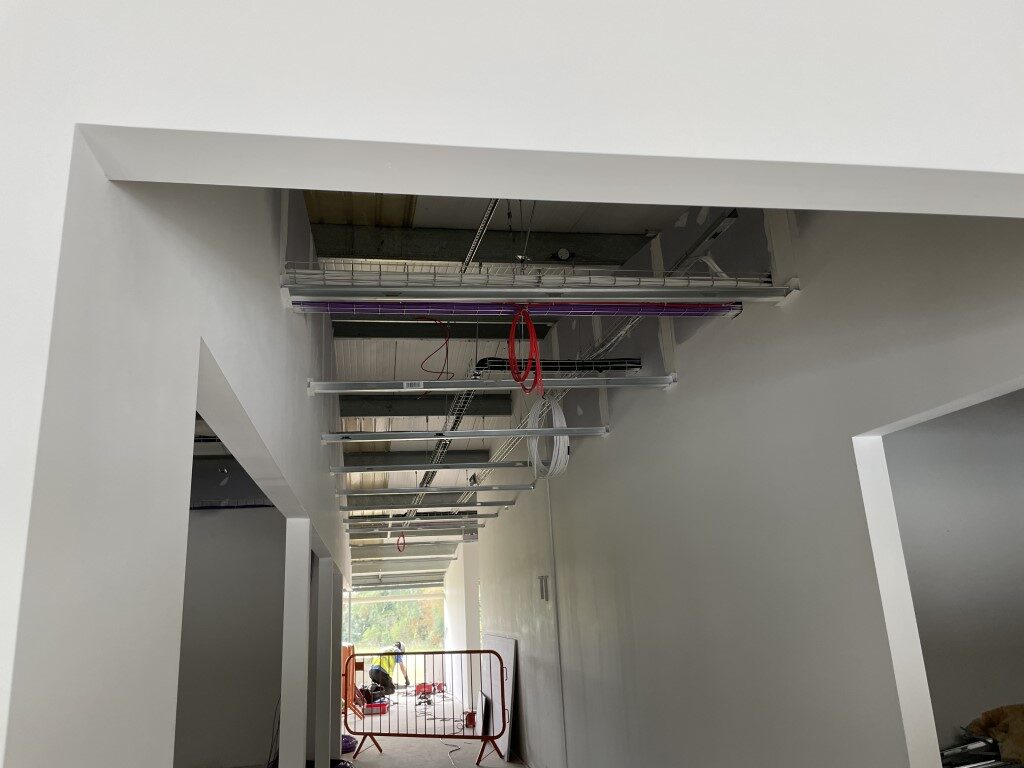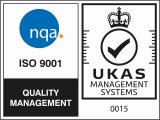Improving your commercial property's EPC rating
Our RICS chartered surveyors act as lead consultants, delivering contract administration of thermal efficiency improvements to a wide range of commercial buildings.
Contract administration for thermal efficiency (EPC rating) improvements
Current regulations mean that since April 2023, most commercial buildings cannot be privately let unless they have an EPC rating of E or above, with large fines payable for any breaches.
Requirements are set to become more stringent in the future, with the government MEES regulations requiring an EPC rating of at least C by April 2027, and at least B by April 2030.
Following the introduction of this legislation, we are seeing more and more clients investing in refits and refurbishments to improve the thermal efficiency of their buildings and decarbonise their property portfolios.
Our surveyors support these clients through contract administration services, managing the entire process of the works, from feasibility through to completion. Our in-house structural engineers assist the project team by providing structural feasibility assessments and calculations for major works.



Our services
- Feasibility assessment
- Site survey and detailed specification review
- Obtaining statutory approvals
- Competitive tender process
- Contract administration
- Cost management
- Final certification
Want to know more?
Effective measures to improve your EPC rating
Fortunately, there are numerous measures available to landlords and business to improve their energy efficiency, reduce their carbon footprint and increase their EPC rating.
Lighting
- It is not unusual for older commercial buildings to still be using halogen or fluorescent lighting. LEDs can be as much as 25 times more efficient that traditional lights, massively reducing energy consumption – and costs – over large sites.
- Additional improvements and savings can be made by adding passive infrared sensors (PIRs), to make sure you are only using lights when there are people in the area. It also means that lights will automatically be off through the night.
- Upgrading the lighting is one of the cheapest ways to improve your EPC rating.

Insulation
- For many buildings, adding and upgrading insulation is the most effective change you can make.
- Improvements can include using insulation boards in flooring, adding insulation to the roof and putting internal insulation in place for any solid brick or metal walls; cavity walls can be insulated too.
- If you are planning on significant changes to the building, you should also consider replacing sections of the envelope that are poor insulators. For example, swapping corrugated plastic for fibre cement-profiled sheeting will considerably increase therapy insulation.
- Adding insulation can be expensive, and it is important to consider when and how to implement these changes to minimise business downtime.
- It is also worth remembering that the insulation will need to be visible to the assessor for it to be included in the EPC; your contract administration surveyor will assist with planning for this.

Draught proofing
- Draught-proofing can significantly increase the efficiency of your heating system by preventing the escape of hot air. It also has the added bonus of making your staff more comfortable in the winter!
- Windows, doors, hatches, plant fittings, piping and cabling should all be assessed and improvements made where necessary. Closing down unused spaces can also have a significant impact.

Heating/HVAC
- The efficiency of your heating system has a significant influence on your overall energy rating. Old, inefficient boilers and air conditioning units are costly and polluting to run.
- Modernizing your HVAC plant equipment can have a dramatic effect on your energy emissions. Consider air source heat pumps, look for energy efficient fan units, and heating and AC that is programmable and zoned.

Hot water systems
- Inspection of the water heating system is often seen as crucial. Ensuring you are getting the most out of our water heating systems, and that the efficiency of thermal storage for the water is maximised, will have a big effect on your EPC.
- Point of use water heaters can make a difference, as can properly insulating your pipes and cylinders.

Upgrading windows
- Installing double or triple glazing is a well-known way to improve your EPC.
- Specialist glass coatings can also reflect heat back into the building and increase solar gain, reducing heating use.
- Alternatively, if air conditioning is a major expense, alternative coatings can reduce radiation from the sun, keeping buildings cooler in summer.

Solar panels and batteries
- For buildings with large electricity bills, adding solar panels can quickly reduce your carbon footprint.
- A structural engineer can calculate the load that your roof can take, after which installation can go ahead.
- Battery storage installations can further optimize energy use, particularly if you will be using electricity after dark.

Building Management Systems
Building Management Systems, when set up well, can significantly improve the efficiency of your HVAC system.
They also allow accurate monitoring or operating efficiency, meaning you can make improvements on an ongoing basis.

Documentation is critical.
EPC assessors will want to see model numbers, u-values, extraction rates, fan sizes and airflow data. They will also want details on the construction of the building, and the materials use.
Our surveyors can prepare all of this information, to ensure that your assessment is straightforward and accurate.
Energy efficiency improvements: Case Studies
Industrial building refurb and thermal efficiency improvement
Works: Act as contract administrators for a £600,000 refurbishment and epc rating improvement of two industrial units.
Property: Two large adjacent units on an industrial estate.
Instructed by: The owner of the property.

Looking for residential / home survey services?
Looking for a RICS Level 2 or Level 3 Building Survey or Specific Defect Survey for a privately-owned residential property? Our team of residential surveyors and engineers can help. Visit allcottassociates.co.uk or Get an Instant Quote.
Alternatively, Allcott Commercial provides surveying services for housing associations and other residential property owners.
We're here to help
If you would like to discuss a potential project with our consultants or get advice on any aspect of building surveying or engineering, please don’t hesitate to complete our contact form, call us on 0333 202 6386, or contact one of our regional offices.



